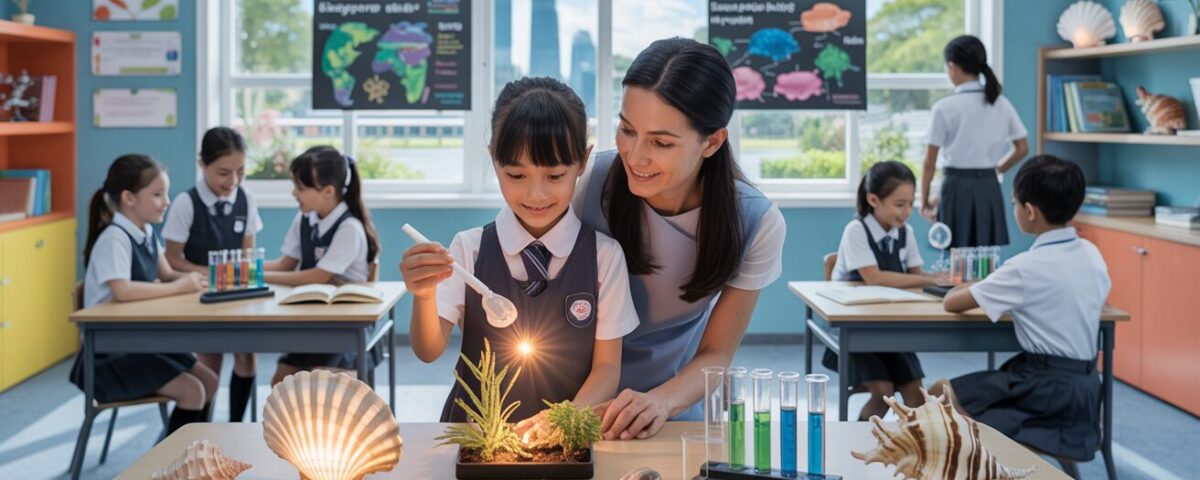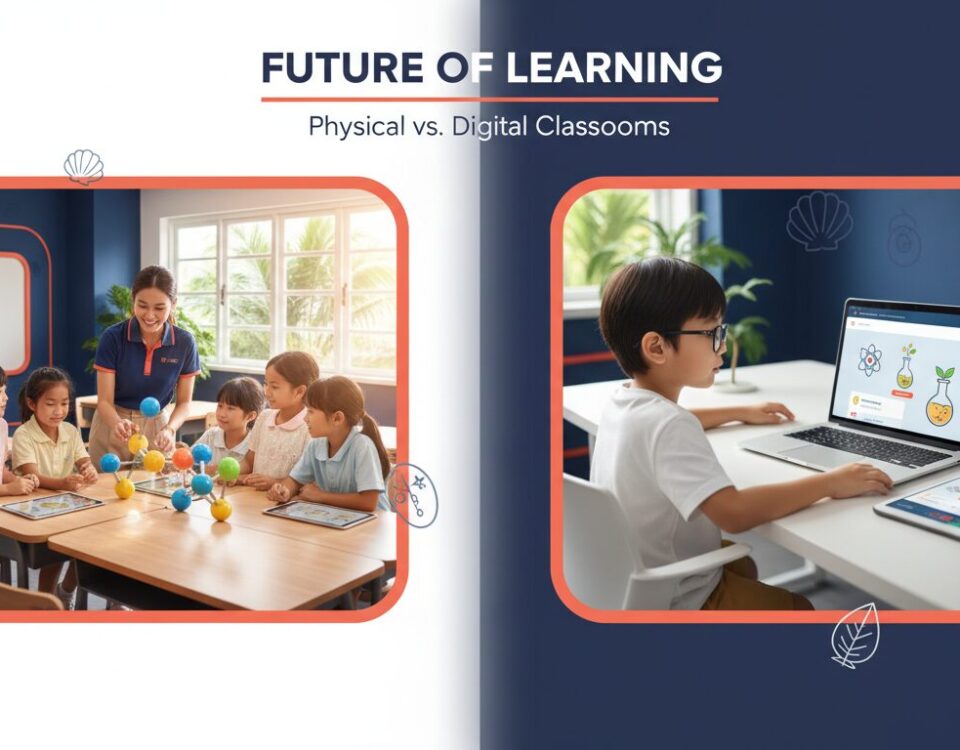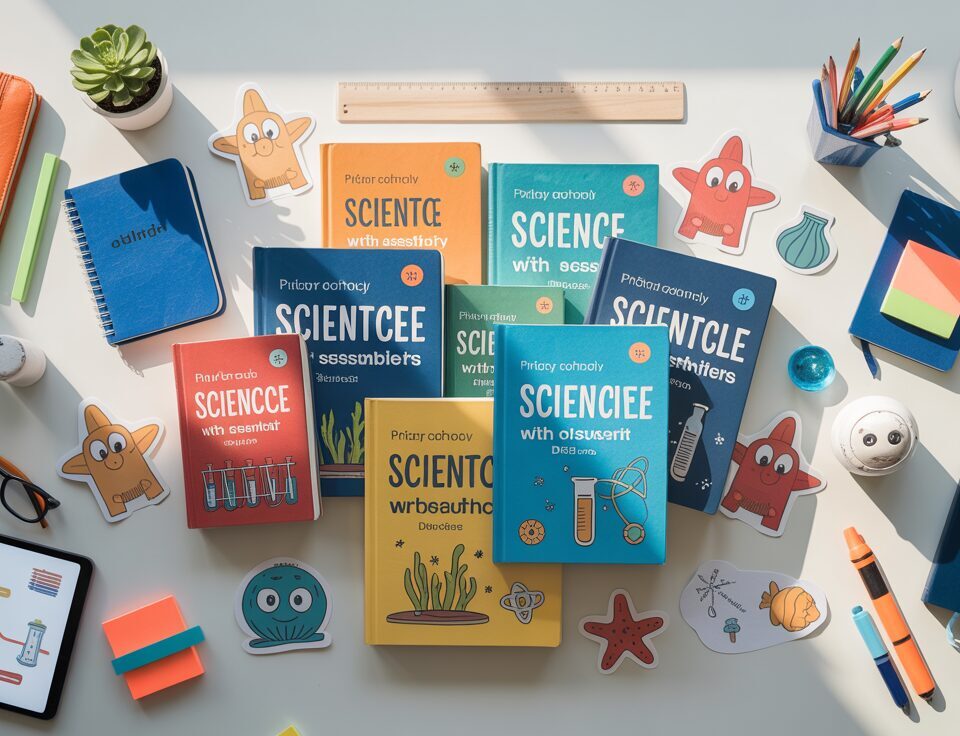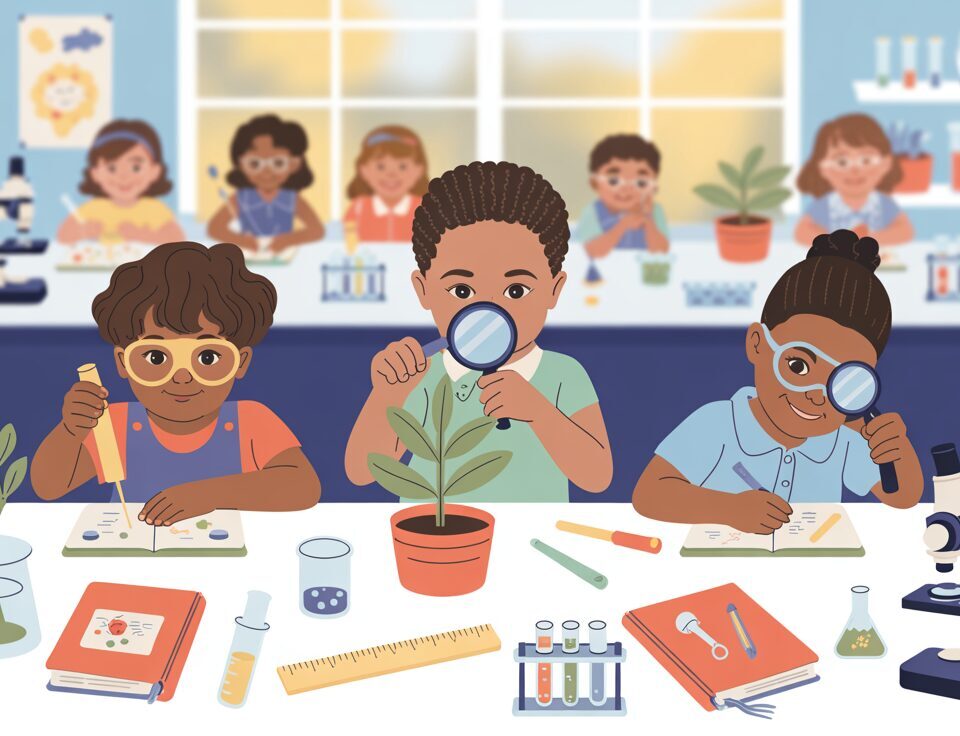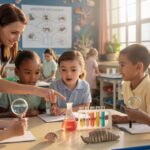
Case Study: How Inquiry-Based Learning Significantly Boosts Science Achievement Levels
October 30, 2025
Top 8 Critical Mistakes in PSLE Science & Expert Strategies to Avoid Them
October 30, 2025Table Of Contents
- Understanding the 2025 Primary Science Syllabus Changes
- Key Content Modifications Across Primary Levels
- New Pedagogical Approaches in Primary Science
- Assessment Changes and What They Mean for Students
- How Seashell Academy is Adapting to the New Syllabus
- Preparing Your Child for the Updated Curriculum
- Frequently Asked Questions About the 2025 Science Syllabus
The upcoming 2025 Primary Science syllabus revisions represent Singapore’s continued commitment to evolving educational standards that prepare students for an increasingly complex world. For parents and students navigating the Singapore education system, understanding these changes is crucial for academic success and maintaining confidence during the transition period.
At Seashell Academy by Suntown Education Centre, we recognize that curriculum changes can create uncertainty for both students and parents. Will the new syllabus be more challenging? How will it affect my child’s learning journey? What adjustments will be needed to ensure continued academic success? These questions are natural, and addressing them early is part of our commitment to nurturing well-prepared, confident learners.
This comprehensive guide examines the significant updates to the Primary Science syllabus for 2025, exploring not just what is changing, but why these changes matter and how they align with modern educational philosophies. We’ll also share practical insights on how Seashell Academy is adapting our teaching methodologies to ensure our students continue to thrive under the new curriculum framework.
2025 Primary Science Syllabus Updates
Key Changes & Preparation Strategies
Core Curriculum Philosophy
The 2025 revisions maintain the five core themes (Diversity, Cycles, Systems, Interactions, Energy) while deepening exploration and creating explicit connections to real-world applications.
Key Content Modifications
- Primary 3: Enhanced focus on plant diversity, materials properties, basic energy transfers
- Primary 4: In-depth life cycles, expanded light and shadows content, introduction to forces
- Primary 5: Integrated human body systems, enhanced electricity content, environmental connections
- Primary 6: Advanced forces and energy concepts, complex ecological relationships, experimental design
New Pedagogical Approaches
Inquiry-Based Learning
Structured opportunities for student-led investigations, emphasizing the scientific process over memorization.
Technological Integration
Digital simulations and data analysis tools to explore complex concepts and develop digital literacy.
Cross-Disciplinary Connections
Integration with mathematics, language arts, and social studies for holistic understanding.
Assessment Changes
Examination Format Shifts
More higher-order thinking questions, scenario-based problems, and data interpretation tasks.
Practical Components
School-based practical assessments and performance tasks requiring application of scientific principles.
How Parents Can Support the Transition
Build Foundational Skills
Encourage observation skills and questioning habits. Practice evidence-based reasoning in everyday conversations.
Support Curriculum Transition
Maintain a positive attitude about changes. Connect school learning to everyday experiences.
Provide Emotional Support
Validate anxieties while expressing confidence. Celebrate the learning process rather than just outcomes.
Embracing Educational Evolution
The 2025 syllabus changes align with modern educational approaches that prioritize critical thinking, application, and scientific inquiry over rote memorization.
Understanding the 2025 Primary Science Syllabus Changes
The 2025 Primary Science syllabus revision represents a thoughtful evolution rather than a complete overhaul of the existing curriculum. The Ministry of Education (MOE) has designed these updates to better align science education with rapidly advancing global knowledge, technological innovations, and the changing skill requirements of the 21st century workforce.
The fundamental philosophy behind these changes centers on fostering scientific literacy through inquiry-based learning while simultaneously developing critical thinking, problem-solving abilities, and environmental stewardship. This approach resonates deeply with our Seashell Method at Seashell Academy by Suntown Education Centre, where we’ve long emphasized the importance of nurturing both academic excellence and cognitive development.
The revised syllabus maintains the five core themes of Primary Science education:
- Diversity
- Cycles
- Systems
- Interactions
- Energy
However, the 2025 syllabus deepens the exploration of these themes while introducing more explicit connections between scientific concepts and real-world applications. This reflects MOE’s recognition that tomorrow’s leaders need not just knowledge, but the ability to apply that knowledge creatively to solve novel problems.
Key Content Modifications Across Primary Levels
The content modifications vary across different primary levels, with each adjustment carefully calibrated to be age-appropriate while building a stronger foundation for subsequent learning. Let’s examine the most significant changes by level:
Primary 3 Changes
For Primary 3 students, the updated syllabus introduces enhanced focus on observational skills and classification systems. The revised content includes:
An expanded section on plant diversity that introduces children to more varied plant adaptations and habitats. This builds a stronger foundation for understanding biodiversity and ecological principles in later years.
A restructured approach to teaching materials and their properties, with greater emphasis on everyday materials’ characteristics and how these properties determine their uses – connecting classroom learning directly to children’s daily experiences.
New content modules exploring basic energy transfers in simple contexts, introducing foundational concepts that will be built upon in higher primary levels.
Primary 4 Changes
The Primary 4 curriculum sees several notable shifts:
A more in-depth exploration of life cycles, with the addition of more diverse organisms beyond the traditional butterfly life cycle study. This provides students with a broader understanding of life cycle variations in nature.
Expanded content on light and shadows, incorporating more hands-on experimental work that develops both scientific knowledge and practical investigative skills.
Introduction of basic concepts related to forces and their effects, laying groundwork for more complex physics concepts in Primary 5 and 6.
Primary 5 Changes
For Primary 5, the syllabus updates include:
A more comprehensive approach to teaching human body systems, with stronger connections between different bodily systems and how they work together to maintain health. This integrated approach helps students develop a more holistic understanding of human biology.
Enhanced content around electricity and circuits, with more emphasis on practical applications and problem-solving through circuit design challenges.
New material on water cycles and environmental systems that incorporates current environmental challenges and conservation approaches, helping students connect scientific principles to pressing global issues.
Primary 6 Changes
The most significant changes appear in the Primary 6 syllabus, as MOE prepares students for the transition to secondary education:
A more sophisticated treatment of forces and energy transformations that builds upon concepts introduced in earlier years while preparing students for secondary level physics.
Introduction of more complex ecological relationships and environmental systems, with explicit connections to current sustainability challenges and potential scientific solutions.
Enhanced content around adaptations and natural selection, providing a stronger foundation for understanding evolutionary biology in later education stages.
Integration of more advanced experimental design principles, encouraging students to develop and test their own scientific hypotheses.
New Pedagogical Approaches in Primary Science
Beyond content changes, the 2025 syllabus emphasizes shifts in how science is taught. These pedagogical innovations align perfectly with Seashell Academy’s established Programme Philosophy, which has long prioritized interactive, application-based learning.
The new MOE guidelines emphasize:
Inquiry-Based Learning
The 2025 syllabus doubles down on inquiry-based approaches where students learn through exploration and discovery rather than passive reception of information. This involves:
Structured opportunities for students to ask questions, design investigations, collect evidence, and construct explanations based on their findings. This process mirrors the actual work of scientists, giving students authentic experience with scientific methodologies.
Greater emphasis on open-ended investigations that allow students to pursue their curiosities within structured frameworks. This approach nurtures intrinsic motivation and genuine interest in scientific discovery.
At Seashell Academy, we’ve long incorporated these principles through our gamified interactive lessons and mind-mapping approaches. Our educators create safe spaces for exploration where mistakes become valuable learning opportunities rather than failures.
Technological Integration
The revised syllabus acknowledges the increasingly digital nature of scientific work and incorporates technology more explicitly into the learning process:
Integration of digital simulations that allow students to explore concepts that might be difficult or impossible to investigate directly in a classroom setting, such as geological processes or cellular functions.
Use of data collection and analysis tools that introduce students to the quantitative aspects of scientific investigation while developing digital literacy.
Our Seashell Method already incorporates technological tools that enhance learning while maintaining the crucial human connection between educator and student. Technology serves as a tool for deeper understanding, not a replacement for thoughtful guidance.
Cross-Disciplinary Connections
Perhaps the most significant pedagogical shift is the explicit focus on connecting scientific knowledge across subject areas:
Integration of mathematical concepts within science investigations, reinforcing numeracy skills while demonstrating their real-world applications.
Incorporation of language arts through scientific communication requirements, where students must articulate their findings clearly and persuasively.
Connections to social studies through examination of how scientific advances impact societies and ethical considerations around scientific progress.
This cross-disciplinary approach aligns perfectly with Seashell Academy’s holistic educational philosophy that views knowledge not as isolated subjects but as interconnected understanding that enriches a child’s worldview.
Assessment Changes and What They Mean for Students
The 2025 Primary Science syllabus brings significant shifts in assessment approaches that reflect the deeper learning objectives of the curriculum. Understanding these changes is crucial for parents and students preparing for examinations, especially the PSLE.
Shifts in Examination Format
The updated assessment framework includes:
A greater proportion of questions testing higher-order thinking skills, moving beyond mere recall to application, analysis, and evaluation of scientific concepts. Students will increasingly be asked not just what they know, but how they can apply that knowledge to novel situations.
More scenario-based questions that present unfamiliar contexts where students must apply familiar scientific principles. This approach tests true understanding rather than memorization.
Increased emphasis on data interpretation, where students analyze experimental results, graphs, or tables to draw conclusions – mirroring authentic scientific practice.
Practical Assessment Components
While written examinations remain important, the revised syllabus places greater emphasis on assessing practical scientific skills through:
School-based practical assessments that evaluate students’ abilities to plan investigations, handle equipment safely, make accurate observations, and record data appropriately.
Performance tasks that require students to apply scientific principles to design solutions to real-world problems, fostering creativity alongside scientific understanding.
At Seashell Academy, our Mathematics Programme already incorporates similar practical problem-solving approaches that complement these new science assessment methods, creating synergy between subject areas.
How Seashell Academy is Adapting to the New Syllabus
At Seashell Academy by Suntown Education Centre, we view the syllabus changes as an opportunity to further enhance our distinctive approach to education. Our preparations include:
Curriculum Alignment and Enhancement
Our MOE-trained educators have been working diligently to:
Thoroughly analyze the new syllabus requirements and identify areas where our existing program already aligns with the updated objectives and where enhancements are needed.
Develop supplementary materials that address new content areas while maintaining our signature engaging, accessible approach that makes complex concepts digestible for young learners.
Create new mind-mapping frameworks that help students visualize connections between concepts – a particularly valuable approach for understanding the more integrated nature of the revised syllabus.
Teacher Professional Development
Our commitment to educational excellence means our teachers are actively enhancing their capabilities through:
Specialized training sessions focused on inquiry-based teaching methodologies and facilitation of student-led investigations.
Collaborative planning sessions where our teaching team shares insights and develops cohesive approaches to the new curriculum requirements.
Ongoing research into best practices for science education globally, ensuring our approaches reflect not just MOE requirements but international educational excellence.
Enhanced Learning Resources
To support the more hands-on, investigative nature of the new syllabus, we’ve invested in:
Expanded science investigation kits that allow students to conduct meaningful experiments that develop both content knowledge and scientific skills.
Digital resources that complement hands-on learning, including simulations and interactive models of scientific processes.
A curated library of age-appropriate scientific texts and media that nurture scientific literacy and expose students to the broader world of scientific discovery.
Preparing Your Child for the Updated Curriculum
For parents wondering how to support their children through this curriculum transition, we offer these practical recommendations:
Building Foundational Skills
Beyond specific content knowledge, certain fundamental skills will be increasingly valuable under the new curriculum:
Nurture observation skills by encouraging your child to notice details in the natural world around them. Simple activities like keeping a nature journal or discussing the changing seasons can develop these crucial scientific abilities.
Develop questioning habits by responding to your child’s “why” questions with “What do you think?” before offering explanations. This encourages the hypothesis-forming mindset that’s central to scientific thinking.
Practice evidence-based reasoning by asking your child to support their ideas with observations or information they’ve learned. The phrase “What makes you think that?” can become a valuable part of your conversation toolkit.
Supporting Curriculum Transition
As your child moves into the new curriculum framework, consider these supportive approaches:
Maintain a positive attitude about the curriculum changes, emphasizing the exciting new learning opportunities rather than potential challenges. Children often adopt their parents’ outlook on educational changes.
Create connections between school learning and everyday life by pointing out science in action – from cooking (chemistry) to playground physics to backyard biodiversity.
Consider supplementary learning opportunities through Seashell Academy’s specialized programs that are already aligned with the forward-thinking approaches of the new syllabus. Our small class sizes ensure personalized attention during this transition period.
Emotional and Psychological Support
At Seashell Academy, we recognize that academic transitions affect the whole child, not just their intellectual development:
Validate any anxieties your child might express about new expectations while expressing confidence in their ability to adapt and grow. Remind them that everyone – including their classmates – is experiencing the same changes.
Celebrate the process of learning rather than focusing exclusively on outcomes. Under the new curriculum’s emphasis on scientific practices, the journey of investigation becomes as important as the conclusions reached.
Ensure adequate rest and recreation, understanding that cognitive demands may increase temporarily as students adjust to new learning approaches. Mental fatigue can significantly impact learning capacity and emotional resilience.
Frequently Asked Questions About the 2025 Science Syllabus
Will the new syllabus be more difficult?
Rather than simply increasing difficulty, the new syllabus shifts emphasis from content memorization toward conceptual understanding and application. Some students may find certain aspects more challenging initially, particularly the higher-order thinking requirements, while others may thrive with the more hands-on, investigative approach. At Seashell Academy, our personalized coaching approach allows us to support each student according to their individual learning profile.
How will the changes affect PSLE performance?
The PSLE Science examination will evolve to reflect the new syllabus, with greater emphasis on application and analysis rather than recall. Students who develop strong conceptual understanding and scientific thinking skills – rather than relying primarily on memorization – will be well-positioned for success. Our approach at Seashell Academy has always emphasized these deeper learning outcomes, which aligns perfectly with the direction of the new assessment framework.
When will schools begin implementing the new syllabus?
While full implementation is scheduled for 2025, many schools have already begun transitional adjustments, incorporating elements of the new approaches and content areas. At Seashell Academy, we’re progressively adapting our teaching methodologies and materials to ensure a smooth transition that maintains educational continuity while embracing positive change.
Embracing Educational Evolution Through the Seashell Method
The 2025 Primary Science syllabus updates represent an exciting evolution in Singapore’s already world-renowned education system. These changes reflect a deeper understanding of how children learn and what skills they’ll need for future success in an increasingly complex, technology-driven world.
At Seashell Academy by Suntown Education Centre, we view these curriculum developments as aligning beautifully with our established Seashell Method. Our approach has always emphasized the balance between academic excellence and emotional well-being, between structured learning and creative exploration, between individual achievement and collaborative growth.
The syllabus changes – with their focus on inquiry-based learning, critical thinking, and real-world applications – validate our longstanding educational philosophy. Our students are already developing the very skills and mindsets that the new curriculum aims to foster.
For parents navigating this educational transition, remember that curriculum changes reflect our growing understanding of how to better prepare children for future success. With the right support – which we’re committed to providing at Seashell Academy – these changes represent not a challenge to overcome but an opportunity for your child to develop into an even more capable, confident, and curious learner.
We invite you to partner with us in embracing this educational evolution, confident that together, we can nurture the next generation of scientific thinkers who approach the world with both analytical minds and compassionate hearts.
Prepare Your Child for the New Science Syllabus with Seashell Academy
Want to ensure your child thrives under the new Primary Science curriculum? Seashell Academy by Suntown Education Centre offers specialized programs aligned with the 2025 syllabus requirements while maintaining our unique approach to holistic education.
Our experienced MOE-trained educators are ready to guide your child through this educational transition with confidence and joy.


